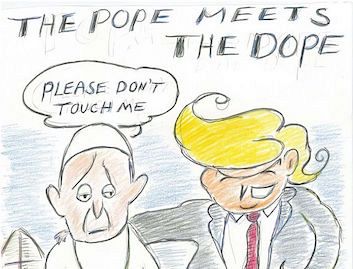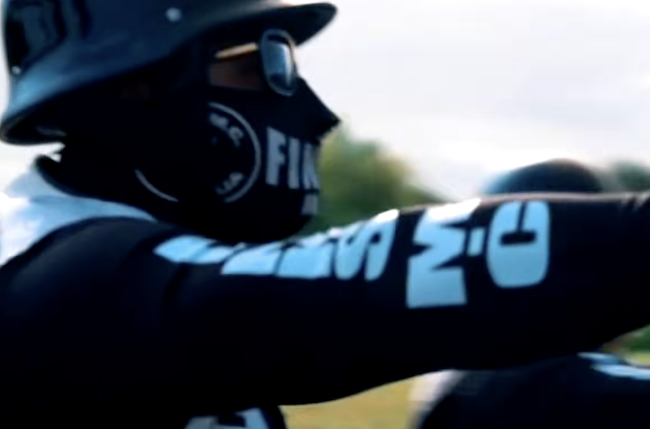President Trump's European visit was akin to the party guest from hell as he barged through, pushing, shaking and hectoring allies into submission, writes Dr Binoy Kampmark.
FROM HIS BIG WHITE BIRD did the U.S. President descend upon his European hosts, who looked much like natives waiting to be slaughtered or ravished.
As Donald Trump pushed his way through NATO members (the Montenegrin Prime Minister, for one, felt his forceful shove) representatives shared glances of discomfort and bemusement.
In a refreshing blast of brutishness, the Ugly American, made flesh in the incarnation of Trump, was explaining, even hectoring Washington’s allies.
The central irritation was one about – as it often tends to be – money.
In the rueful words of Karen Attiah’s penned piece for the Washington Post,
'Trump was the party guest whom no one really wants to deal with but has to — because he has more money than anyone else.'
Pope looks glum after Vatican meeting with Donald Trump https://t.co/IR7LpP3Dg1
— headlinesWIKI (@headlinesWIKI) May 30, 2017
Muscular, military buffoonery comes at a high price, usually to the filched taxpayer. But the issue of where the money goes is almost as important as whether you have it. The largest military power on earth was tired of having to provide a shield of defence without some local compensation and here, its president was claiming some form of fictional proprietorship.
Why, wondered Trump, were NATO members not pulling their military weight not so much over their defence as the obligations owed to the U.S.? Back payments were due and The Donald was under the erroneous impression that they had to be paid directly to the U.S.
The ever dreaded, misrepresented figures were produced by Trump:
"For 23 of the 28 member nations are still not paying what they should be paying and what they are supposed to be paying for their defence ... Over the last eight years, the United States spent more on defence than all other NATO countries combined."
The otherwise unadventurous USA Today, in a piece on the president’s NATO adventure, concluded that NATO members were 'not in arrears in military spending', nor were they 'in debt to the United States'. There was, in fact, no debt.
A more interesting point for the weary arms watcher is that the U.S., for all its fears about the rising tide of Chinese power, continues to dwarf the combined defence expenditures of the next four powers. Freedom Land remains its own burgeoning arsenal — modernising, acquiring and misspending like a drunken lord.
Given such curtness, the more security-minded among the NATO partnership wondered whether the celebrated Article 5 – guaranteeing U.S. support in the event of an attack from a foreign power on a member state – might be abided by. They were left disappointed, even as they looked on at the dedication of a memorial to NATO’s invocation of the Article after the 9/11 attacks on the United States.
In this sense, the Trump show reveals itself in all its unpatriotic worth — a case of business before country, of Brand USA before multiple alliances. That point is missed by those entrusted with the task of reading the tea leaves and deciphering the smoke signals coming from the greatest reality show on earth: the White House.
Former member of U.S. National Security Council, Loren Schulman, said:
“That he couldn’t even say some very benign words that would’ve meant a lot to our allies was really striking.”
The response to Trump from European leaders varied. The Montenegrin Prime Minister Duško Marković, the victim of The Donald’s aggressive shove, responded with a certain amount of conciliatory brown nosing, claiming Trump was merely following the order of standing. Said a recomposed Marković, “This was an inoffensive situation, I do not see it in any other way.”
Then came the chance for France’s newly elected President Emmanuel Macron to make his own show of it. Aware of Trump’s tendency to draw in his unsuspecting opposite number with his meaty paw, Macron stood his ground.
He later told Le Journal du Dimanche:
"My handshake with him [Trump], it wasn’t innocent."
Trump remains his own deterrent against reality, whether it be the liquid existence of money or its pouring. On Twitter, Trump expressed in the aftermath of his visit a degree of satisfaction at what could only be discussed as another illusion.
'Many NATO countries have agreed to step up payments considerably, as they should. Money is beginning to pour in – NATO will be much stronger.'
Increased member contributions were already being engineered in 2014 when NATO member nations pledged to push military contributions to two per cent of GDP by 2024. The commitment was hardly achieved by blood ritual, but this was a pre-Trump world of diplomatic caution. That time scale was longer than any Trump programme could ever be: an entire decade. What matters now, in Trump terms, is instant gratification and swift dangerous performance. Shorter and louder, in other words, is better.
Many NATO countries have agreed to step up payments considerably, as they should. Money is beginning to pour in- NATO will be much stronger.
— Donald J. Trump (@realDonaldTrump) May 27, 2017
Dr Binoy Kampmark was a Commonwealth Scholar at Selwyn College, Cambridge. He lectures at RMIT University, Melbourne. You can follow Binoy on Twitter @bkampmark.

This work is licensed under a Creative Commons Attribution-NonCommercial-NoDerivs 3.0 Australia License
Trump’s evenhanded European tour: Equally offensive to all https://t.co/IkeZvoj454 @IndependentAus
— Karen (@enasharp52) May 29, 2017
Monthly Donation
Single Donation
Days of illusion: Donald Trump’s first 100 https://t.co/9InZlBqPqb @IndependentAus
— Michelle Pini (@vmp9) May 14, 2017
Get the insights. Subscribe to IA.











